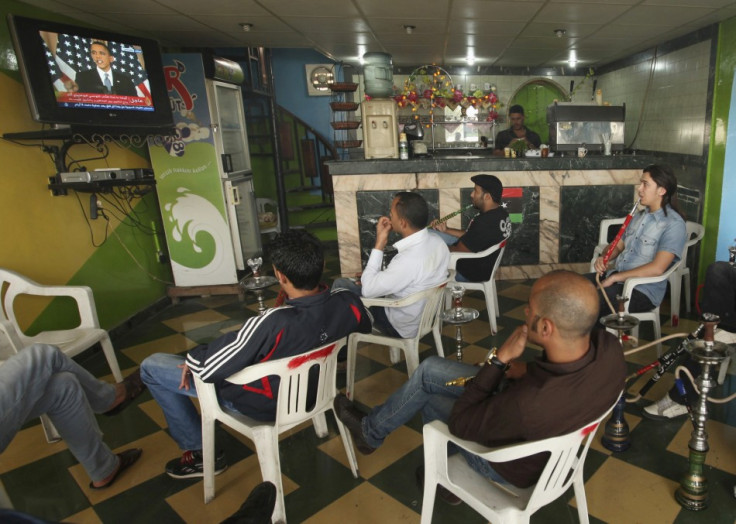Obama Speech: Views from the Middle East

Obama's speech was of broad scope, with the US leader tackling different issues in different countries while using this as an opportunity to give the US response to the Middle East uprisings and regime changes. He pledged international economic support for countries undergoing democratic change, notably Egypt and Tunisia and warned Syria's President Bashar al-Assad to lead transition in his country, or to "get out of the way".
He also was quite straightforward in tackling one of the most sensitive subjects in the region: The Israeli-Palestinian peace process, calling for two states with permanent borders based on the 1967 lines with mutually agreed swaps. Obama's direct proposition on the topic marks a change in US strategy as it brings US policy into line with that of its European allies who rule out a continued Israeli presence in the Jordan valley, which Israel's prime minister, Benjamin Netanyahu, insists on keeping.
How did people react to the speech in the Middle East, and does this discourse really symbolise the start of a "new chapter" in the US-Middle East relationship?
Analysis
Throughout the Middle East, people carefully watched the retransmission of the US president's speech. With America's popularity in the region needing a vital boost, Obama's discourse has been attentively dissected by the media throughout the world. While the speech itself was quite broad, Obama's tactic was clearly to diminish the gap between him and the people in the Middle East. His speech widely referred to popular symbols as he went from talking about the Tunisian street vendor who immolated himself to quoting the slogans that were used during mass protests.
"In Cairo, we heard the voice of the young mother who said: 'It's like I can finally breathe fresh air for the first time.' In Sanaa, we heard the students who chanted: 'The night must come to an end.' In Benghazi, we heard the engineer who said: 'Our words are free now. It's a feeling you can't explain.' In Damascus, we heard the young man who said: 'after the first yelling, the first shout, you feel dignity.'"
Besides establishing a direct dialogue between the masses and himself, Obama's speech demonstrated a will to recover from the breakdown in communication created by the 9/11 attacks and the very defensive behaviour the US adopted at the beginning of the war on terror and during the Bush administration. Trying to further bridge the gap, his reference to Rosa Parks, an international symbol of stnding up to oppression, acknowledged the difficult past of the US in dealing with its multiculturalism, but was also a way of saying that America had previously been there, that America and Americans also have had to fight for their rights and they triumphed as he himself testifies. This direct links definitely posit the United States as a possible good adviser to the Middle East regarding the new steps ahead.
"Sometimes, in the course of history, the actions of ordinary citizens spark movements for change because they speak to a longing for freedom that has built up for years. In America, think of the defiance of those patriots in Boston who refused to pay taxes to a king or the dignity of Rosa Parks as she sat courageously in her seat. So it was in Tunisia, as that vendor's act of desperation tapped into the frustration felt throughout the country. Hundreds of protesters took to the streets, then thousands. And in the face of batons and sometimes bullets, they refused to go home - day after day, week after week, until a dictator of more than two decades finally left power."
Within the Middle East, the stronger reactions mostly seem to have come from Egypt where many people applauded his vision for a democratic regime. While many Egyptians welcome Obama's $2 billion financing proposal for Egyptian economic development, for others it merely represents only one aspect of their mutual relationship. Distrust of the US is still wide amongst the population. Many saw the speech as being a good rhetorical exercise, just like the 2009 speech in Cairo, which did not make any real difference. It seems that the uprisings have given people, in the Middle East, the ability to realize that if change came, it first and foremost came about because of them, because they descended the streets and were willing to risk their own lives. Many observers have noted that by insisting on America's will to support democracies, Obama cleverly also appealed to his own people, for example the Americans who see the need for their country to lead the world towards democracy as a duty. The overthrow of Mubarak in Egypt or Ben Ali in Tunisia, was accompanied by a distrust of political promises and excuses, so Obama clearly has a difficult task. Many are aware that in many cases, it was not money or resources that led their countries to poverty but rather how the money was spent and on who it was spent.
Reactions
For Essam Al-Erian, Senior member of Egypt's Islamist Muslim Brotherhood it is
"A disappointing speech. Nothing new. American strategy remains as is. American cover for dictatorial presidents, in Syria, Yemen, Bahrain remains as is. Perhaps the sharpest tone was toward Libya. American promises are just promises. There is no decisive decision to immediately withdraw from Iraq or Afghanistan. Threatening Iran remains the same."
When it came to Obama's critics of the regimes in Syria and Bahrain the opinion was divided. While some did not even expect Obama to publicly criticise his allies, For Sadegh Zibakalam, professor of political science at Tehran University:
"I expected him to be more serious and harsher in his criticisms of President Bashar Assad [of Syria] and Al Khalifah in Bahrain. Both these countries are run despotically and heavy handedly. Bahrain ... is the U.S.A.'s ally, and Syria is not an ally of the U.S. Both governments are fiercely and brutally suppressing their own people. I expected President Obama to ... clearly put pressure on both governments to cave in to the demands of their own people....The U.S. in particular and the West in general are treating the regional countries with double standards, as the violation of human rights in Saudi Arabia and Bahrain are ignored or neglected while the human rights breaches in Iran are highlighted."
Iranian commentators also reproached Obama's omission of the role played by the Iranian revolution in the regional culture, while Dr. Mohammed el Masri, political analyst at the Center for Strategic Studies at Jordan University commented:
"I thought he was going to go a little further to say there is a serious division. He indirectly mentioned that the American focus on free trade and fighting terrorism was not enough. I hoped he would have said there were gaps in our approach, there were flaws to our approach. That's what I was hoping to hear."
All is not bad though as people understand that America's support is better than its disapproval. The next step for Obama, if he really wants to get back into the people good side in the Middle East will be to remain consistent in pushing for Israel to recognize a sovereign Palestinian state. The Hamas has already questioned Obama's intentions as they deplored the fact he did not mention the suffering of the Palestinian people. A mitigated reaction towards Obama's speech is not a bad start if the US' aim is to renew communication with the Middle East, but as always, it is the actions, not the words that will confirm this in the future.
© Copyright IBTimes 2025. All rights reserved.





















